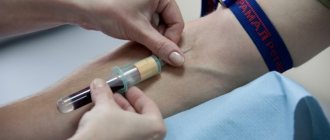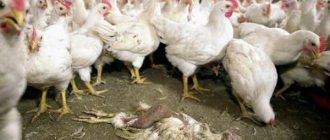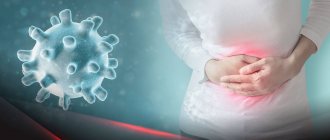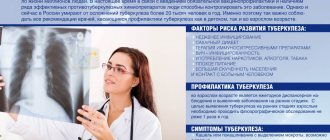Rotavirus infection is an acute infection, manifested by symptoms of intoxication, damage to the gastrointestinal tract in the form of gastroenteritis, enteritis, enterocolitis, and is often accompanied by catarrh of the upper respiratory tract.
It is often called “intestinal flu” in everyday life.
They first noticed the virus in the 20s of the last century, after which research began. In 1973, using an electron microscope, a virus was discovered in biopsy samples of the duodenal mucosa of patients with diarrhea (diarrhea), which was called “rotavirus” (ROT - circle).
It has now been established that most often acute intestinal infections with diarrhea of viral etiology are caused by rotavirus and parvovirus and less often by picornavirus.
Rotavirus infection. Routes of infection and risk groups
The source of infection is a sick person or a carrier of the virus.
People with reduced immunity, children, elderly people and patients with concomitant severe pathologies are most susceptible to viral infection. This infection is most often observed in winter and spring, but isolated cases occur throughout the year.
The routes of infection with rotavirus infection are fecal-oral and airborne. Rotavirus infection is a disease of dirty hands; it is also contracted through contamination of food products. The incubation period takes from 15 hours to 3-5 days.
Rotavirus affects the cells of the mucous membrane of the small and large intestines, reduces the functions of digestion and absorption of food, filtering liquids, and accelerates intestinal motility.
Diagnostics
The results of the following studies help a pediatrician or therapist make an accurate diagnosis:
- a blood test showing an increase in the level of leukocytes;
- stool analysis, where there is an increase in leukocytes, starch grains, as well as undigested muscle fibers;
- serological blood test;
- positive results of infection of cell cultures with viral particles of the patient’s stool;
- PCR method that examines blood and stool samples.
Differential diagnosis is carried out to exclude a bacterial infection; the viral nature of the disease is confirmed by positive results of serological examination and bacterial culture.
Rotavirus infection. Symptoms
- The onset of the disease is usually acute - frequent urge to defecate, the stool is liquid, watery, foamy, sometimes greenish in color, in severe cases up to 8-10 times, in mild cases the stool can be pasty 1-2 times a day.
- Aching or cramping pain in the abdomen, more around the navel and the right half of the abdomen (in the area of the cecum - the right iliac region).
- Symptoms of intoxication: weakness, chills, often without fever, it is noted that high temperature can be observed in no more than 20-30% of patients, loss of appetite and body weight, dizziness.
- Rotavirus infection differs from diarrhea caused by bacteria by a combination of diarrhea (gastroenteritis) and intoxication with damage to the upper respiratory tract (rhinitis - runny nose, nasopharyngitis, pharyngitis - irritation of the pharynx, sore throat).
When to see a doctor?
So, you have noticed your child has a runny nose, cough and loose stools. What to do? Perhaps there is no need to tempt fate by believing that this is just a mild intestinal upset due to the fact that the baby ate a little more fruit the day before or had a slight cold.
Therefore, if the child’s condition allows, go to see a doctor. Whereas if your baby has a high body temperature, frequent diarrhea and vomiting, call an ambulance immediately.
Rotavirus infection. Treatment
Treatment is symptomatic and includes the following measures:
- Diet regimen, gentle food:
- porridge on the water,
- baked fruits (apples and pears),
- meat and fish cutlets,
- dried white bread,
- chicken bouillon,
- berry jelly,
- exclusion or significant restriction of milk.
- Drink plenty of fluids! You can use ready-made glucose-electrolyte powders that were diluted in boiled water - Regidron, Glucosan, Enterodes. You can prepare a solution with the following composition: 1 liter of boiled water + 1 teaspoon of baking soda + 1 teaspoon of regular salt + 2-4 tablespoons of sugar, drink in small sips until bowel function is restored. For an adult, it is recommended to consume 1.5 – 1.7 liters of fluid per 30 kg body weight.
- Antibacterial drugs for viral diseases are not advisable unless there is evidence of bacterial complications.
If, after an infection, chronic diseases of the gastrointestinal tract worsen, then it is necessary to discuss the issues of restorative treatment with a doctor.
The duration of the disease is 5-7-10 days.
This is new material, but Tiger Cub once wrote on this topic - “Rotavirus infection.
(Please note that the information contained in an earlier article may not be entirely current.) Now we invite you to familiarize yourself with the modern view of this problem.The article was prepared by a team of pediatricians at the Tiger Cub Children's Clinic
What is rotavirus and what are its symptoms? How dangerous is rotavirus infection and how to help a sick child, how effective is vaccination against this virus?
About the disease.
Rotavirus infection is one of the types of acute intestinal infection. It is caused by a special type of virus - rotavirus, popularly this disease is often called “stomach flu”.
From the first lines we are clear - rotavirus has nothing to do with the influenza virus and any specific strains of it. Any flu can multiply and exist only on the mucous membranes of the respiratory tract. With rotavirus, everything is different; it “lives” in the small intestine, and therefore calling it the flu as a whole is not very correct.
For the first time, rotavirus (under a microscope resembling a wheel, and therefore called “rota” - wheel (lat.)) was discovered almost half a century ago by Australian researchers. According to existing medical statistics, 98% of children under the age of 3 have already had this disease at least once. It is transmitted the virus is transmitted through contact - fecal-oral, this is popularly called “dirty hands disease”.
A baby can become infected from a sick person through toys, door handles, dishes, and household items. The virus is extremely contagious. Although specific immunity to rotavirus is developed, it is almost irrelevant, since this virus has a lot of strains and varieties - science already knows at least 9 of them, and mutations are still ongoing.
All varieties of this virus are quite resistant to low temperatures, exposure to sunlight and air. Rotavirus survives for quite a long time in spring and sea water.
The incubation period is the time that passes after the virus enters the body until the acute stage of the disease begins. This period of time varies for different children.
The virus accumulates and replicates, usually within 3-7 days. The disease itself lasts about 2-3 days, and the body takes at least another 5 days to recover after recovery.
A child is contagious all the time from the moment of infection until the end of the recovery period. Even if the baby already feels well, viable microparticles of the virus still continue to be released in the stool. It is for this reason that we strongly do not recommend sending him to kindergarten or school immediately after the child feels better. This is very likely to lead to mass infection in the children's group.
The likelihood of infection with rotavirus does not in any way depend on the cleanliness of the family. Even if a mother washes and vacuums the entire house several times a day, if she forces her child to wash his hands with soap every hour, carefully monitors the quality of every product that ends up on the table, and does not allow him to drink water of dubious origin - all this hardly reduces the risk of getting sick. rotavirus.
The virus most often attacks children aged 6 months to 2 years. In general, children from birth to 5 years of age are at risk. In a newborn, this disease occurs somewhat less frequently, since the first six months after birth the child is favorably influenced by the mother’s “innate” immunity, which usually lasts for a maximum of six months. Then the baby becomes more vulnerable.
The World Health Organization provides the following figures: every year on our planet, about 25 million children become infected with rotavirus. Most recover fairly quickly and on their own. 2 million children end up in hospitals, which leads to the death of about 500 thousand children annually, but not from the rotavirus infection itself, but from the severe complications that occur during its course.
Symptoms.
The following main symptoms can be identified: • Diarrhea. • Vomiting • Abdominal pain. • Increased flatulence. • Increased body temperature. • Lethargy, pale skin. • Lack of appetite.
According to our statistics, the vast majority of cases of unexplained diarrhea in children under three years of age are a manifestation of rotavirus infection. In other words, if a child ate everything he usually ate and has no signs of food poisoning, then stool upset in 99% of cases indicates an attack by this particular type of virus.
Rotavirus is tropic (has a special affinity) for pancreatic cells. At the height of the disease, its function is impaired. At first, the stool becomes oily (poorly washed off), has a smooth shiny surface and a clayey consistency. Then transient lactase intolerance develops (the intestinal villi are affected), and the stool becomes increasingly watery. An imperative urge to defecate is characteristic.
It seems that everything that “enters” the child immediately “comes out” without stopping. For this reason, it is quite simple to distinguish rotavirus infection from poisoning (a disorder caused by bacteria) - the main clue for parents should be the consistency of the stool. Pasty diarrhea often occurs with food poisoning. Diarrhea “with water” is a viral diarrhea, and, as a rule, there are no other options.
With viral diarrhea, stool has a grayish color and a very strong, unpleasant odor. By 2-3 days, the contents of the pot acquire a clayey consistency and a yellowish-gray color. The sour smell persists.
Rotavirus infection is characterized by a sudden acute onset - with fever and vomiting. Sometimes vomit may have a specific odor of acetone; a child’s breath may smell similarly. At the next stage, enteritis and gastroenteritis, diarrhea develops (up to 10-12 trips to the toilet per day). Minor respiratory symptoms may appear - runny nose, sore throat, pain when swallowing, cough.
About treatment.
Diarrhea due to rotavirus infection usually goes away within 2-3 days, but poses a rather serious danger of dehydration. Almost all deaths that occurred with this disease became possible precisely because of critical loss of fluid and severe dehydration. The younger the child, the faster he develops dehydration, the more dangerous the rotavirus is for him. The infection is most severe in infants.
A serious complication caused by rotavirus in severe dehydration is pneumonia. Many cases of dehydration are complicated by serious disorders of the nervous system. Rotavirus and dehydration are especially dangerous for underweight children.
The main thing that parents should learn to do is not even to determine the origin of the baby’s diarrhea, but to be able to quickly assess whether the child has signs of dehydration. We strongly recommend that you consult a doctor in any case of diarrhea in a young child. But you can’t just sit still and do nothing; you have to watch carefully.
If a baby's tongue becomes dry, he begins to cry without tears, does not pee for more than 6 hours and practically does not sweat - this is a good reason to urgently call an ambulance. If the baby begins to lose consciousness, his eyes “sink”, his facial features “sharpen”, and he develops a high temperature - these are extremely dangerous symptoms, they indicate severe dehydration. Doctors' help is required immediately.
If dehydration begins, a child who cannot drink enough fluids to restore balance in the body needs intravenous water. This is what the inpatient treatment will be based on.
If there are no signs of dehydration, parents can easily cope with rotavirus intestinal infection on their own. And here the main therapy will be to prevent the onset of dehydration. For this, the child needs to be given water. The more often the better. The drink should not be cold or hot, but only at room temperature, since this is the liquid that is absorbed most quickly in the small intestine. If the baby refuses to drink in sips, he needs to be fed with a teaspoon more often, but he must drink. For rotavirus infection, we recommend taking special medications that should be in the medicine cabinet of every family with children - oral rehydration products (for example, Regidron, Humana Electrolyte). If there is no such medicine, it is not possible to buy it, then we recommend using a recipe approved by the World Health Organization: take 2 tablespoons of sugar, a spoonful of salt and a spoonful of soda per liter of water. The parents’ task is to give their child this saline solution at any cost. If this does not work, it is better to immediately call an ambulance.
First aid.
In general, the algorithm for reasonable parental actions in case of childhood diarrhea should always look like this: • Drink plenty of warm drinks. Frequent and fractional. Plain water and saline solution. If a child pees every 3 hours, it means he is consuming enough fluid to prevent dehydration. If you can’t get someone to drink even with a disposable syringe without a needle, call an ambulance. • Place a small child on his side so that in the event of an attack of vomiting he does not choke on the vomit. • Antipyretics - only if the temperature is above 38.5. • Monitor the child's condition and prevent dehydration. At the first symptoms of dehydration, call an ambulance. • Do not feed. If he really asks, give liquid porridge or puree in small quantities.
Before the doctor arrives, leave a diaper with stool or keep a sample of the contents of the potty to show the doctor. This way, the doctor will be able to diagnose the disease faster, and the likelihood of an error will be reduced (rotavirus, for example, is very similar to cholera in its initial stages).
It's a big mistake to give your child antibiotics. The disease is of viral origin, and antibacterial drugs are completely powerless against viruses. Treating a child with viral diarrhea with them is a real parental crime, since it not only does not bring benefit, but also increases the likelihood of complications.
Another mistake that can cost parents dearly is the unauthorized prescription of antidiarrheal drugs (for example, Enterofuril). With rotavirus, viral particles (more precisely, their microparticles) are released in the stool. Therefore, stopping diarrhea means prolonging the disease, leaving viral particles in the small intestine, where they will continue to destroy beneficial cells for some time. There is no need to fight diarrhea; it is a defense mechanism of the body.
Another misconception is the effectiveness of antiviral drugs for intestinal infections. Although some doctors continue to prescribe antiviral drugs for rotavirus infection, we strongly do not recommend taking them for an intestinal infection. Of course, whether or not to take the above tablets or syrups is up to you. But you should know that there are no antiviral drugs in nature with clinically proven effectiveness. Moreover, the effectiveness of these drugs against a specific pathogen, rotavirus, has not been proven. It is also worth abandoning homeopathic remedies (Anaferon, Oscillococinum). With them, with their effectiveness and proven action, everything is even worse (yes, this is possible), and the purchase of such drugs will only be an extra burden on the family budget and can cause additional stress for the baby.
Vaccination.
Many countries have already included vaccination against rotavirus intestinal infection in their mandatory National Vaccination Schedules. In Russia there is no such mandatory practice yet. Vaccination against rotavirus, according to Western experts, helps reduce morbidity by 80% and reduces the risk of death by 45%. That is, infection remains possible, but the course of the disease will be milder.
In the children's clinic "TIGER" the RotaTek vaccine is used to prevent rotavirus infection. The vaccine is taken orally (as drops in the mouth). RotaTek contains small quantities of live rotavirus artificially weakened in laboratory conditions. In most cases, the vaccine does not cause allergic reactions or side effects, it is quite easily tolerated even by the smallest patients.
The recommended vaccination period is from 1.5 months to six months. It is not advisable for older children to be vaccinated. A total of 3 doses of the vaccine are administered. Standard recommended RotaTek vaccination schedule: 2 - 3 - 4.5 months.
Naturally, vaccination will not be given to a child who is currently ill; vaccination against rotavirus is also contraindicated for children with congenital malformations of the gastrointestinal tract. As before any vaccination, before vaccination with RotaTek you need to see a pediatrician with test results (clinical blood test and general urine test). No special preparation is required for rotavirus vaccination.
Advice for parents.
During the acute phase of the disease, you should not feed the child unless he asks for food himself.
You should adhere to a strict diet not only during treatment, but also for some time after recovery: completely exclude from the menu whole milk and dairy products, sweet fruits, baked goods, meat, as well as fatty and fried foods. It is healthy to eat porridge with water, vegetable soups, white bread crackers, and oven-baked apples. Feeding should be frequent and in small portions. Very young children with rotavirus infection are not denied breast milk, no dietary restrictions are imposed, but they are ensured that they drink plenty of fluids. Breast milk itself contains antiviral components provided by nature, which will help the baby in the recovery process.
Occasionally, when rotavirus infection is severe, an infant may develop intolerance or partial intolerance to breast milk due to enzyme deficiency. In this case, you should reduce the number of breastfeedings and temporarily add lactose-free infant formula to the baby’s diet (until complete recovery).
A child sick with rotavirus should not necessarily be put to bed. If he has a high temperature, then bed rest is necessary. In all other cases, he should lead a normal lifestyle - play, walk.
Of course, you should stay away from the yard playground so as not to spread the rotavirus to other children, but a walk in an uncrowded park or square will be beneficial.
The most effective prevention of rotavirus is vaccination. Only then comes hygiene - you must wash your hands, of course with soap, thoroughly wash vegetables and fruits, and monitor the quality of the water your child drinks.
But once again, in fairness, we note that no hygienic tricks can guarantee a low probability of infection. Therefore, both in developed and civilized countries and in third world countries, the incidence of rotavirus is at an equally high level. If you are going to travel to the sea with a small child, we strongly recommend the rotavirus vaccine. Recently, this intestinal infection has become quite widespread at resorts, where children become infected with water. Every year, Rospotrebnadzor specialists “signal” about the unfavorable situation due to this disease on the Black Sea coast of the Caucasus, in Crimea and on the coasts of Bulgaria.
Prevention of rotavirus infection
Specific prevention (vaccine) has not been developed in Russia (vaccines against rotavirus infection are available in the USA and some European countries). In this regard, general preventive measures coincide with those for other intestinal infections and additional measures to prevent the spread of infections by airborne droplets.
Natural waters and tap water can be contaminated with rotavirus; it is believed that this is one of the main reasons for the increase in incidence. Boiling water is required!
Personal hygiene is mandatory: washing hands before eating, after going outside, before preparing food. Wash fruits thoroughly with hot water.
Rotavirus is washed off and neutralized with toilet and laundry soap and washing powders. And a simple practical recommendation: when going outside, lubricate your nasal passages with soap - this is more effective than wearing a mask on the subway! If there is a sick person in the family, then it is necessary to isolate him for 10-15 days, and the apartment must be wet cleaned.
Causes
Rotavirus infection develops as a result of the interaction of the virus with a susceptible organism under certain conditions. Pathogens entering the digestive tract begin to multiply and infect intestinal epithelial cells (enterocytes), causing their death.
The destruction of microvilli leads to changes in the functions and structure of the intestinal epithelium, impaired absorption of nutrients and water, which ultimately provokes diarrhea syndrome and dehydration of the body.
Risk factors for the disease:
- weakened immunity,
- poor environmental situation,
- hypothermia,
- swimming in contaminated pools and ponds,
- stress,
- allergy,
- non-compliance with sanitary and hygienic standards in food preparation,
- drinking unboiled water,
- prolonged contact with the virus carrier.
Diet
Therapy should begin with proper nutrition. Older children and adults should exclude from their diet:
- Any plant foods (berries, vegetables, fruits, including dried);
- Bakery and flour products;
- Fatty, salty, spicy, fried foods;
- Whole milk;
- Broths.
According to recent studies, all these foods strengthen the intestines, which is why diarrhea will persist a little longer. During illness, it is recommended to eat boiled, lightly salted porridge in small but frequent portions.
An unpleasant surprise - rotavirus during trips and travels
Many stories have been told on the Internet about how rotavirus ruined a vacation while traveling abroad. This usually happens with small children, but cases are not excluded when the whole family spends several days, what is popularly called, “embracing the toilet.” One of these cases, although it ended happily, was not pleasant enough. Thailand. Vacation. Heat. A family with a 9-month-old child is admitted to the hospital. Diagnosis: rotavirus infection. It was not possible to combat dehydration with improvised means; it is difficult to explain to a child at this age that he needs to drink a lot. Therefore, for 3 days of vacation, instead of swimming in the sea and riding elephants, there were IVs and other treatment. It’s good that insurance was taken out that covered this “entertainment”, because the bill that was presented to the insurance company was about 100 thousand rubles.
Pathogen
The causative agent of this infectious disease is considered to be rotavirus, which belongs to the Reovirus family. This virus received its name due to its significant external resemblance to a wheel, which translated into Latin sounds like a company. There are 8 different types of rotaviruses, but the most commonly detected type is rotavirus A, which in 90% of cases is isolated from humans during the development of this disease.
Genetic information is represented by a genome containing a ribonucleic acid molecule consisting of 2 strands surrounded by a capsid, which is a protein shell containing 3 layers. On the outside, the virus does not have a protective capsule, which is often called a supercapsid. The virus reaches a diameter of 65 to 75 nanometers and is well resistant to low temperatures, which confirms the fact that its properties are preserved after repeated freezing. But when boiled, as well as when exposed to alcohol, it dies instantly. Its stability in an aquatic environment is also noted when chlorine compounds are used.
What it is?
Rotavirus infection is an infectious disease caused by rotaviruses. It is the most common cause of diarrhea in children. This disease is characterized by an acute onset, moderate symptoms of gastroenteritis or enteritis, and a frequent combination of intestinal and respiratory syndromes in the initial period of the disease. Rotavirus infection is often incorrectly called "stomach flu", although rotavirus is not related to influenza viruses.









